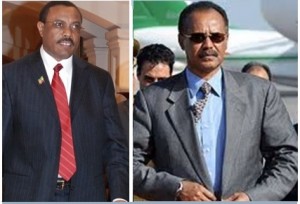Ethiopia and Eritrea Moving Towards Peace Talks with Sudan as Mediator
 The relationship between Eritrea and Ethiopia is arguably the most important and volatile in East Africa. The fall-out between the former brothers-in-arms initiated a two-year-long border war in 1998, which claimed around 100,000 causalities, cost billions of dollars, and continues to serve as the main source of regional instability in the Horn of Africa.
The relationship between Eritrea and Ethiopia is arguably the most important and volatile in East Africa. The fall-out between the former brothers-in-arms initiated a two-year-long border war in 1998, which claimed around 100,000 causalities, cost billions of dollars, and continues to serve as the main source of regional instability in the Horn of Africa.
The fighting was brought to an end with the signing of the Algiers Peace Agreement and establishment of the Ethiopia-Eritrea Border Commission (EEBC) in 2000. However, Ethiopia’s refusal to implement the rulings of the EEBC prior to negotiations and Eritrea’s insistence on an unconditional and immediate demarcation of the border, have locked the two governments in an intractable stalemate.
Despite the official cessation of hostilities in 2000, Ethiopia and Eritrea continued their war through proxies by supporting various rebel movements throughout the Horn of Africa. In this way, they have been fueling conflict and instability in each other’s countries as well as the wider region.
Thirteen years after the Algiers Peace Agreement, domestic conditions in both states and the regional geopolitical equation have undergone substantial changes.
Now,according to a report by allafrica.com, Ethiopia and Eritrea are in secret talks mediated by Khartoum with a view to end the historic conflict between the two nations.
Sudan’s President Omar al-Bashir revealed on Thursday December 5th 2013 that he had initiated indirect talks between the leaders of both countries, bringing them on the negotiating table to discuss border disputes, proxy wars in Somalia and other political issues.
“We started some efforts to normalise the relations between Ethiopia and Eritrea,” President Bashir said, in a joint statement with Ethiopian Prime Minister, Hailemariam Desalegn.
Eritrea seceded from Ethiopia after a bitterly fought independence war in 1991.
Unresolved territorial disputes between the two states thereafter escalated into a full-scale war. The Eritrean-Ethiopian war fought from 1998 to 2000 over the border town of Badme in northern Ethiopia left thousands of casualties, millions of dollars spent and only minor border changes.
Both Addis Ababa and Asmara continue to trade accusations of supporting rebel groups against each other.
These proxy wars took an international dimension when the Ethiopian army invaded Somalia in 2011 to shore up the interim government against Islamist rebels – who were funded by Eritrea according to a UN report.
President Bashir said Sudan, based on its “friendly relations with both countries”, could promote healthy and neutral discussions between the two adversaries.
“I will call the two presidents to hold a summit in Khartoum in the [near future]” Mr Bashir said.
Delicate issue of Bademe
At the heart of the stalemate are symbolic politics and domestic constraints on both sides – of which the contested border town of Bademe is an embodiment.
It is very possible that the EPRDF will hand over the symbolic town of Bademe to Eritrea – which was awarded to the latter by the EEBC – but it can only get away with such a move domestically by selling it as a necessary sacrifice for a comprehensive and durable peace. The fact that the individuals leading the current Ethiopian government did not take part in the decision-making processes of the border war and subsequent peace agreement, means that they are less constrained by the commitments of their predecessors.
For President Afwerki, on the other hand, the stakes are much higher. In fact, resolving the stalemate is likely to create more challenges than benefits to his personal power base. The suspension of the parliament and the constitution, the universal and indefinite military conscription policy, and in general, the system of one-man rule have all been justified by the need to counter the “Ethiopian threat”. A settlement of the border issue would eliminate the rationale for maintaining this system and would undoubtedly lead to new domestic demands for addressing the nation’s many political and humanitarian problems.